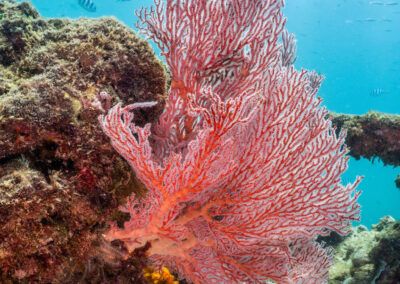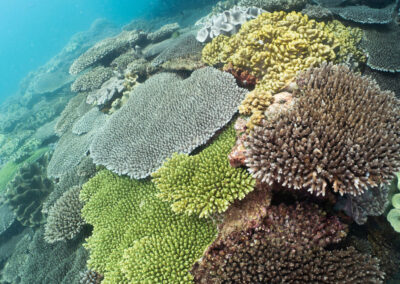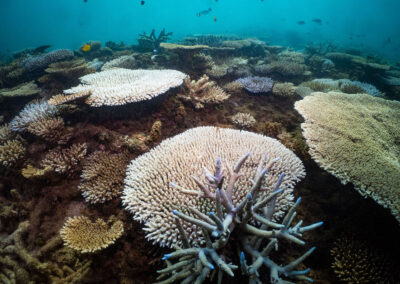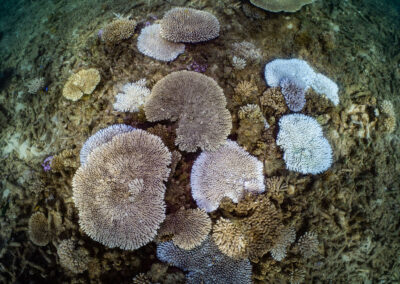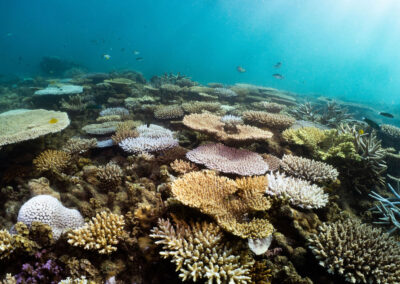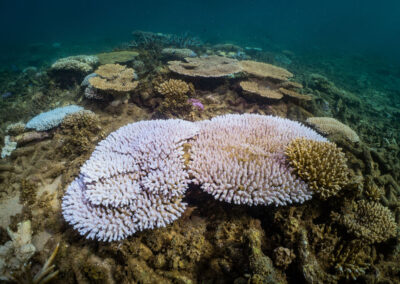Coral
What is coral?
Although they resemble plants, corals are actually animals! Individual corals are called polyps, with most living in colonies comprised of hundreds of thousands of genetically identical polyps.
Algae called zooxanthellae live in the tissues of corals in a mutually beneficial relationship that provides corals with oxygen, removes waste, and supplies food via photosynthesis. This algae also gives coral its distinctive colours. Deep-sea corals do not rely on photosynthesis for energy and take in plankton and organic matter instead of algae (1).
Watch this educational video by James Cook University about coral.
Two main types of coral:
Hard corals extract calcium from seawater to build a hard skeleton of calcium carbonate that attaches to rock or the dead skeletons of other polyps.
Soft corals are non-reef-building corals that do not have a hard skeleton. Their polyps have eight tentacles each, making them easy to identify.
Corals and Sponges of Exmouth Gulf
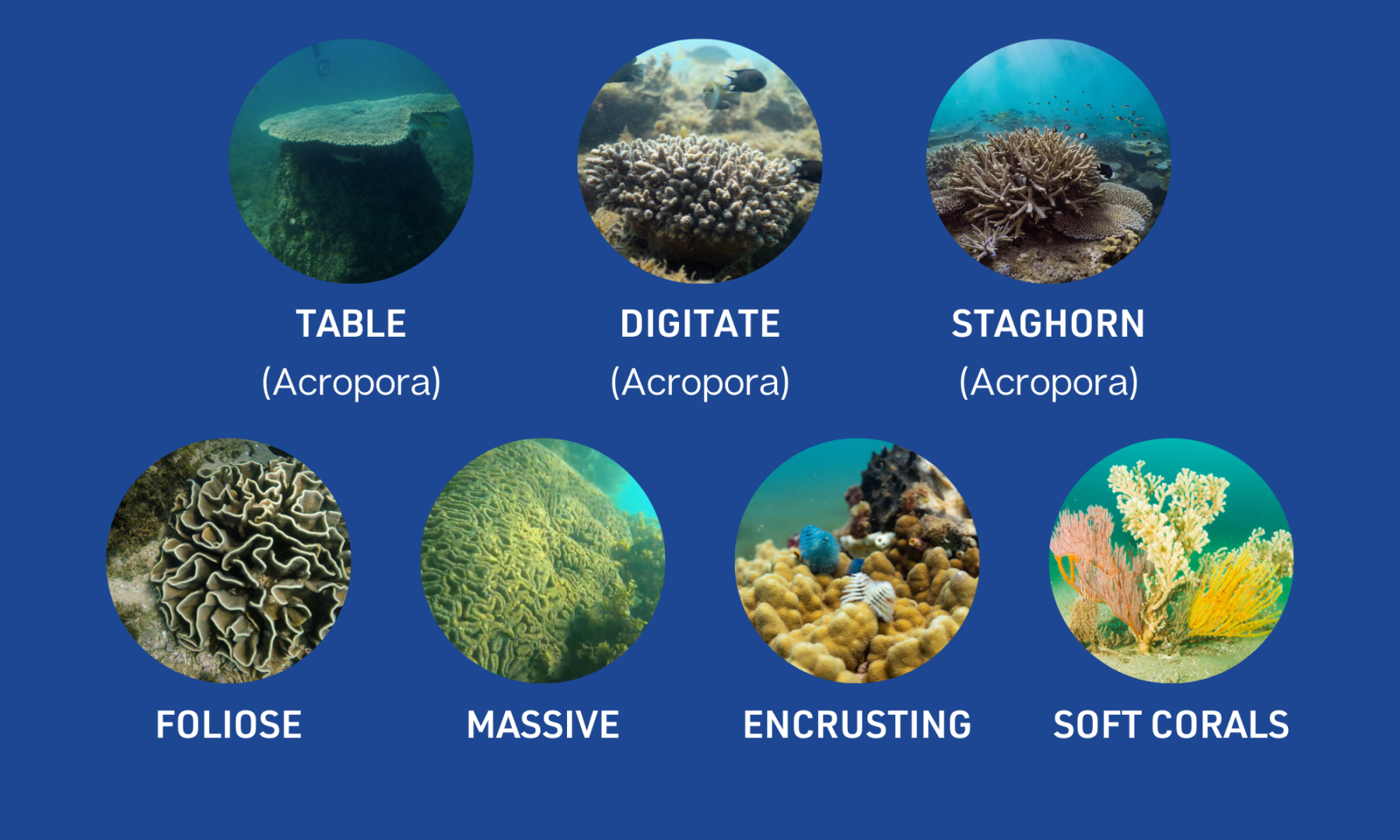
Why is coral important?
Coral reefs are incredibly diverse and valuable, supporting a quarter of all known marine life (7).
They provide a number of important ecosystem services and benefits, including:
- Forming the basis for complex food webs, which supports an incredible diversity of fish and other species. These fish and other creatures use coral reefs to feed, reproduce, rear young, and shelter (7).
- Creating a barrier that absorbs wave energy and contributes to the reduction of coastal erosion. This barrier reduces damage from storms and cyclones, protecting coastal communities as well as ecosystems, like seagrass beds and mangroves – all of which are found in Exmouth Gulf-Ningaloo (7).
- Playing a critical role in providing protection, food, and income for over half a billion people worldwide (1).
- Coral reefs provide many opportunities for recreation. Tourism generates jobs for local communities as visitors enjoy activities such as snorkelling, diving, and coral viewing on the reef (1).

A sustainable future
In Exmouth Gulf-Ningaloo, coral reefs play an important part in supporting a booming ecotourism industry and providing great opportunities for research.
The Ningaloo Reef (including Exmouth Gulf) was estimated to provide over 1000 full-time jobs and contributed $110 Million in added value to the state economy from 2018-2019, with 90% attributed to international and domestic tourists visiting the reef. (4) Growing around islands and continents, fringing reefs like Ningaloo are close to the shore, making them ideal for recreational activities like snorkelling, but also vulnerable to overuse and damage from coastal development (7).
Read more about the economic, cultural and social values of Ningaloo.
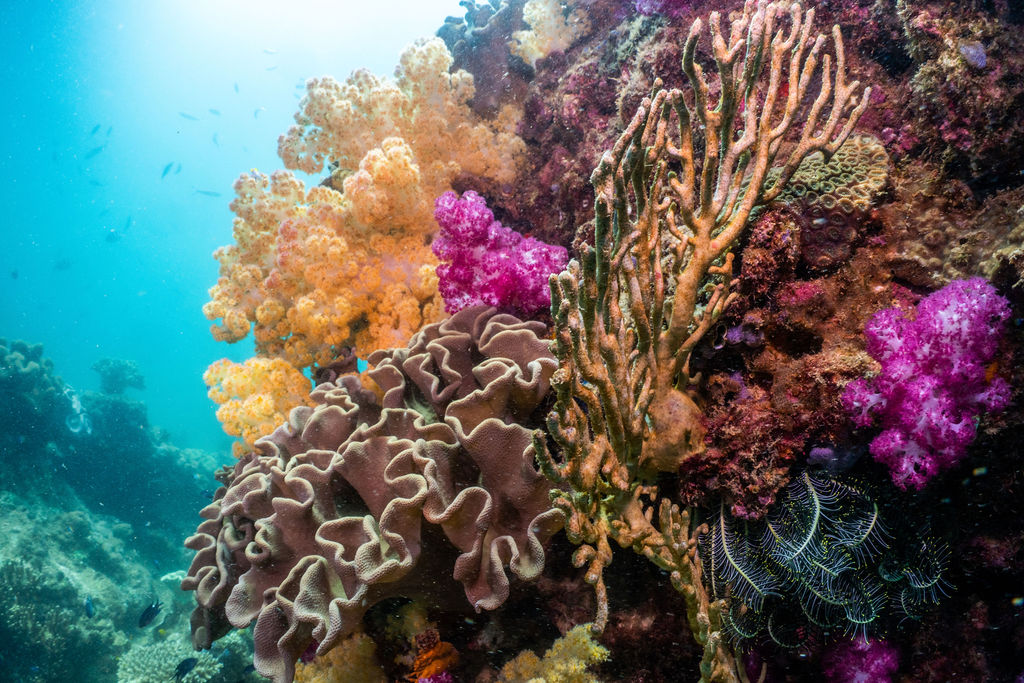
Coral bleaching
When corals are stressed they expel zooxanthellae from their tissues, leaving white skeletons. Deprived of their food source, corals begin to starve.
The primary cause of coral bleaching is rising ocean temperatures caused by climate change. If raised water temperatures persist for eight weeks or more, corals begin to die (8). Depleted water quality, increased sun exposure and extreme low tides can also cause bleaching (2).
The good news is, coral reefs can recover from bleaching events if elevated temperatures only occur for a short period of time. Healthy corals can help repopulate an area if bleaching is localised, where surviving corals can take in algae again after a few months (6).
Other threats to coral reefs:
- Sea level rise- less sunlight which is crucial for growth
- Coastal development
- Agricultural and industrial runoff and pollution
- Unsustainable fishing practices
- Damage from boats, recreational activities
- Ocean waste including plastics
Further reading on coral bleaching:
- https://www.marineconservation.org.au/coral-bleaching/
- https://www.climatecouncil.org.au/wp-content/uploads/2022/03/In-Hot-Water-Briefing.pdf
- https://www.dbca.wa.gov.au/parks-and-wildlife-service/resilient-reefs-ningaloo#:~:text=Resilient%20Reefs%20is%20being%20delivered,may%20face%20in%20the%20future.
Bleached corals at Bundegi Reef, Exmouth Gulf.
©Blue Media Exmouth
References
-
- https://www.noaa.gov/education/resource-collections/marine-life/coral-reef-ecosystems
- https://www.climatecouncil.org.au/wp-content/uploads/2022/03/In-Hot-Water-Briefing.pdf
- https://www.icriforum.org/about-coral-reefs/what-are-corals/
- https://www.dbca.wa.gov.au/sites/default/files/2021-01/Economic%20contribution%20of%20Ningaloo.pdf
- https://oceanservice.noaa.gov/facts/coralwaters.html
- https://www.sciencefocus.com/nature/can-coral-reefs-recover-from-bleaching/
- https://www.epa.gov/coral-reefs
- https://www.barrierreef.org/the-reef/threats/coral-bleaching

